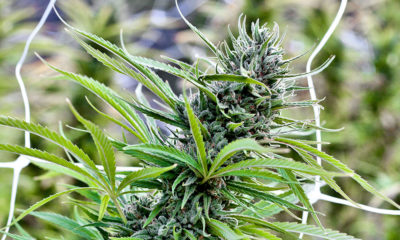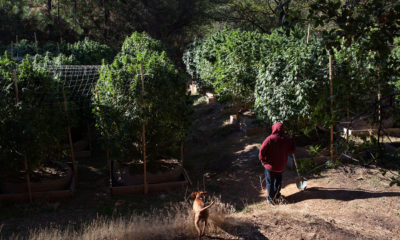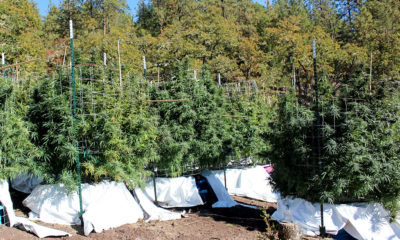
Cultivation
Chile Unveils Largest Cannabis Farm in Latin America
El Dorado does exist.
Chile is now home to the largest cannabis plantation in Latin America. The farm, which will supply 4,000 patients with medical marijuana, was formally inaugurated on Jan. 19.
About 275 kilometers south of Santiago lies a small village name Colbun. Colbun is home to the massive 6,900-stalk cannabis farm that is reported to yield about 1.65 tons of cannabis this year from March to May. The farm will operate under the supervision of the government’s agricultural service.
Ana Maria Gazmuri was a soap opera star in Chile during the ’80s and has become one of Chile’s most outspoken cannabis advocates. Gazmuri now leads the Daya Foundation, a cannabis activist group in Chile.
“This farm will further permit people to see for themselves the reality of the plant, and what its uses are,” Gazmuri told Reuters.
Chile is currently going through a cultural revolution. The youth in Chile are demanding abortion rights, same-sex unions and the decriminalization of cannabis. According to recent data, seven out of 10 Chileans said they support the legalization of cannabis for medical purposes.
The cannabis movement in Chile hit a high note in 2013, when 50,000 protesters took to the streets of Santiago and other cities to demand the decriminalization of personal amounts of cannabis. Some estimates put the number at 200,000. Demonstrators demanded to amend “Article 50 of Law 20.000 on illicit drug trafficking, which punishes drug use in public places.” There efforts were not in vain.
In October of 2014, Chile became the first nation in Latin America to cultivate marijuana strictly for medical purposes. The following April, the Health Commission of the Chamber of Deputies approved cultivation for personal amounts.
In December of 2015, the Chilean government set up a program to authorize the sale and cultivation of cannabis. Chile follows programs that are already established in countries like Puerto Rico and Colombia. The Chilean Congress is currently debating the decriminalization of small amounts of cannabis for personal use and cultivation.
Originally, a test farm was set up in 2014 for observation at an undisclosed location in the La Florida district of Santiago. The test farm supplied around 200 cancer patients with cannabis oil.
“Even if people do not believe it, Chile is now the regional pioneer in medicinal cannabis cultivation,” Gazmuri said. “The objective of this project is to generate three major clinical studies that will be conducted by the National Cancer Institute and two hospitals.”
The research from the new program will be funded by 20 Chilean municipalities and will go towards patients with serious illnesses such as cancer and epilepsy. The Daya Foundation runs an additional cannabis plantation in Quinamavida near Talca, Chile.
The Daya Foundation will oversee the operation in Colbun and the production of cannabis oil will be part of a clinical study into the efficacy of medical marijuana.
“Eventually, we want to make cannabis medicine available for everybody, even if they can’t afford it,” said Nicolas Dormal, co-founder of the Daya foundation.
Chile’s mostly conservative government has taken strides to slow Gazmuri’s program down. The government has recently opened up to new ideas like gay marriage and medical cannabis.
“Regarding marriage equality, regarding cannabis, regarding abortion – the majority opinion is in favor of securing these rights,” Gazmuri said.
The changes in Latin America have been seen from Uruguay to Mexico. Uruguay legalized recreational cultivation in 2013. The Colombian President Juan Manuel Santos legalized medical cannabis despite government opposition. In addition, the Mexican Judiciary Committee also eased restrictions on medical marijuana last November.
Currently, cannabis is still listed on Chile’s list of hard drugs. If a person is caught cultivating or in possession of cannabis, they can be sentenced to a 10-year prison sentence.
“We are clearly living changes in policies in Chile and in public perception,” Gazmuri said.
Are you a Chilean who supports marijuana? We want to hear from you.
























